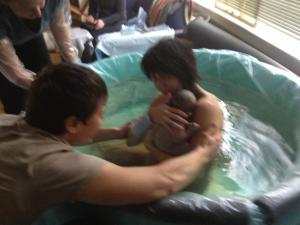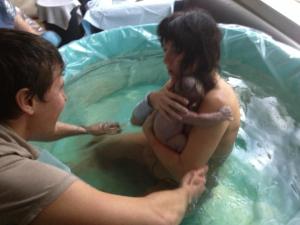There’s an article circulating media that is about a woman’s tragic account in giving birth at home. She is upset, angry and adamantly advises against many of the things she believed going into birth: she’s a birth warrior, put trust in your body, do it at home. She is clearly traumatized by the experience (“has nightmares,” “is consumed by what happened”), which of course is more than understandable considering her son almost died, but what is also clear is her driving need to put blame somewhere. In this case the blame is having a home birth and all of its deceptive rhetoric.
I have no desire to do much analysis on her story here (I do question the care she received) other than the way trauma drives us to find some semblance of control, which often leads to a binary: home births with midwives are bad, being at hospitals are good. The binary mentality feeds the hungry mouths of American culture, not only about birthing practices, but every other topic imaginable. We want to be justified and consoled by our safe ideology and feel threatened when it shakes or when difference challenges our white knuckled grip.
I want to allow blood to rush through those hands and continue to speak on the birthing subject because it’s important and deserves a better handling than binary conclusions, whether it’s midwives are ill-equipped or shaming those who want an epidural and a hospital. We can do better than that and so let’s make room for intricacies.
First, there is something appallingly flawed within our medical system in which the patient is routinely the object. I’ve heard too many stories about women being persuaded and sometimes coerced into being induced or having a C-section and dare I say before 5pm. Is it strange that the number of babies being born significantly decreases over the weekends (Tuesday is the biggest day for births and Monday follows)? There is 1) a problem with the role and sometimes arrogant, self-seeking practice of doctors, 2) a historical problem with the silencing of women’s voices over their bodies, desires and knowledge and 3) how the the medical field then implicitly shapes the way women see and experience their bodies i.e. women scheduling unnecessary inductions to end pregnancy.
Please note that I don’t believe every doctor is an arrogant arse nor do I believe a person’s voice deserves trumping over sound wisdom and quality care. It’s more of a cultural attitude and position I’m speaking to. There are too many first hand accounts to believe there is something collectively awry.
A few pieces of data to consider. The CDC and World Health Organization are the 2 primary places I’m pulling statistics from as well as University of Minnesota’s Center for Spirituality and Healing:
According to the CDC, home births have a lower risk profile than hospital births, with fewer births to teenagers or unmarried women, and with fewer preterm, low birthweight, and multiple births.
According to WHO, C-Sections in any region should only account for only 10-15% of all births (USA is 32.8%).
Epidurals and inductions increase your chances for a C-Section and other complications, according to UMN:
Most researchers have concluded that epidurals or other regional anesthesia may be associated with longer labors, longer pushing, increased risk of vacuum, forceps, and cesarean sections, as well as increased risk of other complications, such as low blood pressure (which might adversely affect the baby), fever, headache, and nerve damage. (It should be noted however that a newer research study challenges the association with longer labor lengths and increased cesarean sections.)
Also note the costs for medical interventions have tripled. An average cost for a C-section is $15,000. There is money in herding women into a particular way of giving birth.
I’m not denying the necessity of technology and intervention, but when it is the dominant machinery for delivering babies rather than a primary trust in the body, who usually knows what to do and when, is frightening. This perspective not only leads to more costs and complications in birth, but also on a grander scale, body image distortions and disorders, wars executed by a few buttons, the earth being pillaged and ultimately an escape from the essence and rule of nature. We no longer can face death of any kind.
Wendell Berry speaks to this issue:
Only when our acts are empowered with more than bodily strength do we need to think of limits.
It was no thought or word that called culture into being, but a tool or a weapon. After the stone axe we needed song and story to remember innocence, to record effect–and so to describe the limits, to say what can be done without damage.
The use only of our bodies for work or love or pleasure, or even for combat, sets us free again in the wilderness, and we exult.
But a man with a machine and inadequate culture–such as I was when I made my pond–is pestilence. He shakes more than he can hold.
(from the book, What Are People For?)
My aim in writing about birth has more to do with exulting our bodies through being set free again in the wilderness. There is certainly far more to be said, researched and made clear about the one whom “shakes more than he can hold” and therefore puts trust and power in tools and instruments. But instead, I come here to remind myself and possibly you about the wilderness, which beckons forth exultation instead of fear and anxiety. I’m here to remind us all that each of us is complex and requires intricate and patient answers, especially when it comes to birth.
Since we cannot simply get over fear and anxiety, we must enter both through our narrative by familiarizing ourselves with how our bodies, pain and voices were regarded in our stories. We all have many accounts to which we’ve experienced harm, neglect and parental anxiety. Whether it was a mother who was constantly worried about your pain and safety or a family member who sexually abused you and manipulated silence or parents who didn’t ever speak or consider their bodies’ health and needs. Of course there are a myriad of other stories that could be told, ones I’ve heard, ones I’ve experienced and stories so subtle and insidious, it requires a practitioner of some kind to name them. Simply put, our bodies carry, conceal and cleverly disclose the tragedies of our past. Until we can lament over the past, realize the places where we’ve made vows to (I’m weak, pain is only an attack, I’m too much) and eventually bless what is yours and mine–both the goodness and brokenness–approaching anything difficult, namely birth, has the potential of becoming one more tragedy in our arsenal of vanquished expectations. Worse off, it may mean having no hope or desire for witnessing your creative body in action and result in merely getting through it–in other words, numbing proverbial death.
So the blessing may come in the form of surrendering to hospital care or easing pain that elicits memories of trauma and heartache or wanting life more so than the risk of death when death has been a familiar companion. The blessing may come by an invitation to trust your body and its resources.
Giving ourselves understanding for why we choose what we choose will only consecrate our decisions. We will have more courage to face the unexpected and possible disappointment, awareness of our desires and reverence for our efforts.
We will discover how the body longs to heal and be restored, to open up and bring life. I look at my widened hips or scabbed over wounds or weighty breasts and exult over the brilliance of creation. Yes, there are times when intellect and intervention are required, but it’s critical for us to first revere the body as far more intelligent and insightful.
To listen and observe, then proceed.
To listen and observe, then proceed.
To allow the body to suffer through what is necessary as well as passionately long for glimpses of bodily glory–these are the acts that give us gratitude not only for ourselves, but those around us and essentially gratitude for the Creator who anticipates, yearns for and undergirds the means for life even if it’s through the experience of death.
I want to create a birthing culture that invites more presence to our bodies’ stories, awareness of how we’ve succumbed to pain and death and lastly, I want to see more women in awe of their fiercely life-giving abilities whether it’s at a hospital or in the comfort of a home. Our bodies matter, our birthing experiences matter, our voices in singing and retelling the stories of death and life deeply matter.
May it be so.


Recent Comments